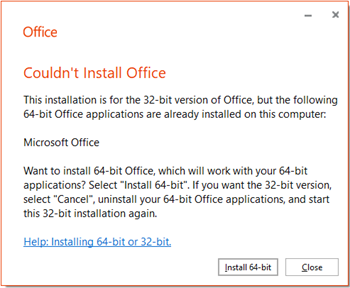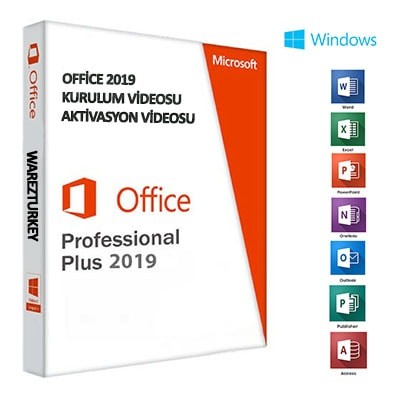

- How to update office to 64 bit 64 Bit#
- How to update office to 64 bit download#
64-bit Office apps perform better with very large files, videos and tables across Office in Excel, PowerPoint and Project. We have optimized the latest version of Office to take advantage of the specs and configurations of these modern desktops. As more and more modern desktops now run in 64-bit, the benefits of 64-bit Office continue to increase. Using 64-bit Office offers multiple advantages over the 32-bit version, including: Office 365 ProPlus and Office 2019 continue to offer both 64-bit and 32-bit versions, the only change is that 64-bit is now the default installed version. This post gives a little bit more background on the change and opens a place to further the conversation with the community on the 64-bit version of Office ProPlus and 2019. We have also seen the rest of the industry catch up in support of 64-bit Office add-ins. We are excited about the 64-bit default update, because it allows customers take advantage of the resources of current hardware and a 64-bit operating system for increasingly common heavy workloads in Office. Set objBrowse = objShell.Office has been available in both 32-bit and 64-bit for several years and beginning at last Ignite, we updated our recommendation and now default setting to 64-bit. Set objBrowse = objShell.BrowseForFolder(&H0, Caption, Options, RootPath & Chr(0)) Set objBrowse = objShell.BrowseForFolder(&H0, Caption, Options, CLng(RootPath)) Set objShell = CreateObject("Shell.Application") 'RootPath kann ein String oder CSIDL-Konstante seinĭim objShell As Object, objBrowse As Object Optional Options As vbShellGetFolderFlags = BIF_DefaultOptions) As String Optional RootPath As Variant = CSIDL_PERSONAL, _ Private Const CSIDL_PERSONAL = &H5 'Eigene Dateienĭebug.Print ShellGetFolder(CSIDL_PERSONAL, "Select a folder", BIF_BrowseFolder) Path2MyDocuments = WSHShell.SpecialFolders("MyDocuments")Īnd use this as replacement for SHBrowseForFolder: Option ExplicitĬonst BIF_DefaultOptions = BIF_EDITBOX Or BIF_VALIDATE Or BIF_SHOWALLOBJECTS Or BIF_STATUSTEXT Or BIF_NEWDIALOGSTYLEĬonst BIF_BrowseFolder = BIF_RETURNONLYFSDIRS Or BIF_DefaultOptions Set WSHShell = CreateObject("Wscript.Shell") ' Path2MyDocuments = Left$(Path2MyDocuments, InStr(Path2MyDocuments, vbNullChar) - 1) ' If SHGetPathFromIDList(, Path2MyDocuments) Then ' If SHGetSpecialFolderLocation(0, 5, IIDL) = S_OK Then Here is a replacement for SHGetPathFromIDList: Private Function Path2MyDocuments() As String 
Would someone please help, so that I might resolve this?īoth function are not compatible with 64-bit, especially SHGetPathFromIDList can crash you application, even if you change the declaration to 64-bit!!! Declare Function SHGetPathFromIDList Lib "shell32.dll" _Īlias "SHGetPathFromIDListA" (ByVal pidl As Long, ByVal pszPath As String) As Longĭeclare Function SHBrowseForFolder Lib "shell32.dll" _Īlias "SHBrowseForFolderA" (lpBrowseInfo As BROWSEINFO) As Long

How to update office to 64 bit download#
I did download the file referenced in here, but because mine is a function, and not a basic macro, I'm not clear on what to change. I did some looking into this, and found a few articles, but none match what mine is based on- or perhaps I should say that I'm not seeing it. I got the error which says I need to change it to work on the new machine. Yes, I've been running an older machine for several years now, but my office machine is 64 bit.
How to update office to 64 bit 64 Bit#
I've brought in an older set of vba code, with my personal.xlsb file to a 64 bit machine.







 0 kommentar(er)
0 kommentar(er)
